Air source heat pumps are an energy-efficient method of heating your home, but there is a common misconception that they are only a viable option for houses, not flats. You can install an air source heat pump in a flat, although there are some potential challenges that may need to be overcome. There is, however, poor uptake of this heating option at present. In the UK, 16% of households use a heat pump as their primary heating system. Of these, only 2% live in flats.

Air source heat pumps can be installed in flats, and they are one of the best options in terms of energy efficiency. Here, we'll be talking about how heat pumps work, the benefits of using an air pump in a flat, and the potential pitfalls you might encounter.
Check out: Do Air Source Heat Pumps Work In Old Houses

An air source heat pump system absorbs ambient heat in the outside air and uses it to heat your home. Some models can also be used to heat domestic hot water.
Most air source heat pumps consist of an outdoor unit and an indoor unit (although some models house all of the components in the outdoor unit only).
A coil absorbs heat from the air (this will work even at temperatures well below freezing) and uses it to heat a refrigerant liquid until it evaporates into a gas. It is then compressed to further raise the temperature.
The heated gas flows to a heat exchanger (usually located in the indoor unit) which transfers it to the heat distribution system. This could be fans, ductwork, radiators, or underfloor heating.
Once the heat has been exchanged, the gas condenses into a liquid refrigerant again and goes back through the system.
Uncover more: How Does An Air Source Heat Pump Work

There are two main types of air source heat pumps. Air-to-air heat pumps transfer the heat directly into the air of the property.
To heat a single room, this is achieved using a coil fan unit. To heat multiple rooms, a network of these units that all connect to the indoor air source heat pump unit can be installed. Alternatively, ducts can be run throughout the property to take the heated air to different rooms.
An air-to-air heat pump is also an air conditioner and the mechanism can be easily reversed to cool the property rather than heat it.

An air-to-water heat pump does not directly heat the air in the property. Instead, it connects to existing heating systems and heats the water present in them.
Heating is achieved either through radiators or underfloor heating systems by heating the water that runs through them.
An air-to-water heat pump can also be used for the hot water system to heat the water that comes out of the taps.

Ground source heat pumps work similarly to air source heat pumps. The only difference is that instead of absorbing heat from the outside air, they absorb heat from underneath the ground.
A network of underground pipes carries water which is heated through the ambient heat in the ground, and this water is taken to the outdoor unit to heat the refrigerant liquid. From this point, the mechanism is identical to an air source heat pump.
A ground source heat pump cannot be used to directly heat the air in the property through fans or ductwork and can only be connected to the wet heating system. They can't as easily be used as an air conditioner.
Gain insights: How Much Does It Cost To Install Ground Source Heat Pump

Compared to traditional gas boilers, air source heat pumps are many times more efficient. Even the highest-rated gas boiler will have an energy efficiency of 90-98%. In comparison, a heat pump system will have an energy efficiency of 300-400%.
This means that every unit of electricity used to power the heat pump will produce three to four units of heat.
Using an air source heat pump to heat your flat will reduce your electricity usage and your carbon footprint.
The situation for energy bills is a little more complicated and this is mainly because electricity is much more expensive than gas.
While you do use much less energy to power an air source heat pump, because it uses more expensive electricity, the savings aren't immediately obvious. At first glance, it will cost around the same as gas heating systems for standard homes that are not perfectly insulated.
However, for flats, it is more likely to be cost-effective and reduce your electricity bills. Flats are generally better insulated than houses because they have fewer outside walls. This extra insulation means you will have less heat loss.
Insulation is especially important for the efficiency of an air source heat pump because it is designed to run at a consistent temperature.
If you lose heat, this forces the heat pump to work harder to maintain the desired temperature, which demands more electricity usage and increases the cost.
In a well-insulated flat, with little heat loss, your air source heat pump can work at maximum efficiency, reducing your energy costs. On average, an air source heat pump system pays for itself in seven years, when taking into account the reduction in energy bills.
The lower running and energy costs are a benefit to you but the reduction in your carbon footprint from using a highly efficient heating system is a benefit to the planet.
The majority of energy usage in the UK is through heating our homes. Choosing sustainable energy sources and methods that reduce our reliance on fossil fuels will have a big impact on the environment.
The government is committed to net zero, which outlines plans for the country's carbon emissions to be zero. This will be achieved through increased usage of sustainable and renewable energy sources, such as solar panels and wind turbines, and a switch from fossil fuel heating systems to sustainable ones.
In fact, there is due to be a ban on the installation of gas boilers in new builds and to replace old ones by 2035. Heat pumps will soon become a standard way to produce heat for our homes.

Air source heat pumps need outdoor space. The external unit must be placed outside for it to work. It is usually recommended that the outside unit be placed on the ground next to a property wall but some models can be wall-mounted.
If you do have outdoor space such as a balcony, the unit can be placed there. It is around the size of a washing machine so will take up some room, and it will require about one metre of clearance around each side and front to be as efficient as it can be.
If you live in a ground-floor flat with a garden, space won't usually be too much of an issue. It can be placed on the ground as it would be for a full house.
The unit can also be placed on a flat roof if this is an accessible option or it can be mounted on the wall outside your flat. It will need to be accessible for servicing and maintenance, however, which can be more challenging with these types of installations.
An air source heat pump doesn't usually require planning permission because it comes under permitted development rules. But this is only the case if you are the freeholder of the flat. If you are not, you would need to seek permission from the owner of the building before installing a heat pump.
You may also need to consider the building regulations if you live in a block of flats. There could be restrictions regarding what can be installed.
A major concern for many people is the noise level of air source heat pumps. They do indeed make some noise, but the newer models are far quieter than the older ones. Noise reduction has been a key focus as heat pump technology has progressed.
With that being said, noise levels are particularly important for heat pumps installed in flats because of the tight living space and the proximity to neighbours.
Before installation, your installer will conduct a thorough noise assessment to ensure that any noise made by the heat pump is not disruptive to you or anyone living close by.

An air-to-air heat pump is an ideal heating system for a single flat. It is cost-effective, will give you lower energy bills, and can be used as an air conditioner as well. They can be easily mounted to a wall if necessary and they require minimal internal work to put in place.
There are compact models available that will fit in quite small spaces and, since you are only heating a single flat, these will usually give you sufficient heat output.
Of course, they can't be used to generate domestic hot water, but they will still have an impact on your energy efficiency and usage through heating.
Installing an air-to-water heat pump, including the other heat pump system types, like a ground source heat pump, can be more challenging if the central heating infrastructure is shared between flats in any way. They require modifications to the wet heating system that could impact other flats, and this may not always be possible.
Some buildings that house flats are moving towards shared heat pump systems (usually a ground source heat pump or air-to-water air source heat pump) that heat all of the flats in the building but this is a decision that the owner of the building would need to make.
Explore: Where To Install An Air Source Heat Pump

We install heat pumps in properties of all kinds, and we are experienced in the unique challenges and needs of flats. If you are unsure if a heat pump would work in your situation, we can help. We will visit your home to assess its suitability and suggest the perfect heat pump type and placement to work for you. We are happy to work with the owner of the building to ensure that the heat pump will be acceptable to them.
Contact us today to find out how heat pump installation could reduce your energy usage and keep your flat warm and comfortable.
Can heat pumps be installed in flats? Yes, but not enough people are aware of this. Heat pump technology is improving all the time and compact, quiet models are available that work perfectly for flats. Installing a heat pump will improve your energy efficiency, reduce energy costs, and lower your carbon footprint. Moving towards natural heat sources and away from fossil fuels is the future of heating our homes, and this includes flats. While there may be limited space, both indoor and outdoor units can be wall-mounted and discreet.



